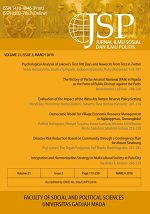The Influence of Domestic Politics of South Korea on its Relations with North Korea and the United States
Miftah Farid Darussalam(1*)
(1) Department of International Relations, UIN Alauddin Makassar
(*) Corresponding Author
Abstract
This paper aims to conduct research on the influence of domestic South Korean politics on relations with the United States and North Korea. In this case, the theory of dominance of domestic political actors explains where the dominance of a group will have an influence on determining the foreign policy of a country. South Korea’s domestic politics is dominated by two groups with different ideologies in the face of the United States and North Korea. This then resulted in different actions in the face of North Korea and the United States. The differences will be explained by assessing some of the policies applied to Kim Dae Jung’s regime and Roh Moo-Hyun from a progressive group. The policy will then be compared to the policies of the regime of Lee Myung Bak from conservative groups. Differences in the group’s dominant views in South Korea have led to certain strategies for each group in the face of the opposition group. The strategy is carried out to maintain the effectiveness of the policies applied according to the ideology of each group. This research used literature study as the method by taking data from journals and reports which that discuss the national politics of South Korea. The theoretical framework of V.M Hudson, which focuses on the national circumstances, and the role of domestic actors have been applied in this research.
Keywords
Full Text:
PDFReferences
Bae, J. Y. (2010). South Korea Strategic Thinking Toward North Korea : The Evolution of The Engagement Policy and Its Impact Upon US-ROK Relation. Asian Survey 50(2), 335-355. doi: 10.1525/as.2010.50.2.335
Chaebong, H. (2008). South Korea Miraculous Democracy. Journal of Democracy 19(3), 129-142. Retrieved January 10, from, https://www.rand.org/pubs/reprints/ RP1370.html.
Choi, J. K. (2010). Sunshine Over a Barren Soil : The Domestic Politics of Engagement Identity Formation in South Korea. Asian Prespective, 34(4), 115-138. doi: 10.1353/ apr.2010.0008.
Doucette, J. (2010). The Terminal Crisis of The “Parcipatory Government” and The Election of Lee Myung Bak. Journal of Contemporary Asia, 40(1), 22-43. doi: 10.1080/00472330903270338.
Han, Y. S. (2002). The Sunshine Policy and Security on the Korean Peninsula : A Critical Assesment and Prospect. Asian Prespective, 26(3), 37-69. Retrieved January 7, 2018, from http://www.js tor.org/stable/42704373.
Ho, M. S., & Hong, C. S. (2012). Challenging New Conservatice Regimes in South Korea and Taiwan. University of California Press, 52(4), 644-665. doi: 10.1525/as.2012.52.4.643.
Joong, H. J. (2010). The Rise and Fall of Anti American Sentiment in South Korea. University of California 50(5), 946-964. doi: 10.1525/as.2010.50.5.946.
Kang, W. T. (2008). How Ideology Divide Generation: The 2002-2004 South Korean Election. Canadian Jurnal of Political S c i enc e 4 1 ( 2 ) , 4 6 1 - 4 8 0 . d o i : 1 0 . 1 0 1 7 / S0008423908080438.
Kim, S. (2000). The Politics of Reform in South Korea : The First Year of the Kim Dae Jung Government 1998-1999. Asian Prespective, 24(1), 163-185. Retrieved January 9, from https://www.jstor.org/ stable/42704252?seq=1.
Lee, H. Y. (2003). South Korea in 2002 : Multiple political dramas. Asian Survey, 43(1), 64-77. doi: 10.1525/as.2003.43.1.64.
Lee, S. H. (2008). ROK-US Relation in Lee Myung Bak Government : Toward a Vision of a ‘21st Century Strategic Allience. The Journal East Asian Affairs, 22(1), 1-32. Retrieved February 15, 2018, from http:// www.jstor.org/stable/23257872.
Mun, C. I. (2009). South Korea in 2008 : from crisis to crisis. Asian Survey. 49(1), 120-128. doi: 10.1525/as.2009.49.1.120.
Paik, H. (2002). Assessment of the Sunshine Policy: A Korean Prespective. Asian Prespective 26(3), 15-35. Retrieved February 15, 2018, from http://www.jstor.org/stable/42704372
Park, J. C. (2008). Lee Myung-Bak Administration’s North Korea Policy: Challanges and Tasks. The Journal of East Asian Affairs, 22(2), 39-61. Retrieved February 15, 2018, from www.jstor.org/ stable/23257896.
Park, M., & Lie, J. (2006). Economic Dynamism, Generational Conflict, and Social Transformation. Asian Survey 46(1), 56-62. doi: 10.1525/as.2006.46.1.56.
Park, M. K., & Kim, P. (2010). Inter-Korean Relation In Nuclear Politics. Asian Prespective 34(1), 111-135. doi: 10.1353/apr.2010.0034.
Park, S. H., & Wilding, M. (2016). The Politics Government Reform in Korea : From Tripartite to Bipartite Politicization. Administration and Society 48(9), 1059-1084. doi: 0.1177/0095399714527753.
Shin, K. Y. (2012). The Dillemas of Korea’s New Democracy in an Age of Neolib eral Globalisation. Third World Quarterly 33(2) , 293-209. doi: 10.1080/01436597.2012.666013.
Yoon, J. H. (2011). The Effect of US Foreign Policy on Relationship Between South and North Korea. Journal of East Asia Studies 11(2), 255-287. doi: 10.1017/S1598240800007189
Zhu, Z. (2007). Small Power, Big Ambition : South Korea’s Role in Northeast Asia Security Under President Roh Moo-Hyun. Taylor and Francis, Asian Affairs 34(2), 67-86. doi: 10.1017/S1598240800007189.
Article Metrics
Refbacks
- There are currently no refbacks.
Copyright (c) 2020 Jurnal Ilmu Sosial dan Ilmu Politik

This work is licensed under a Creative Commons Attribution-NonCommercial-NoDerivatives 4.0 International License.






















